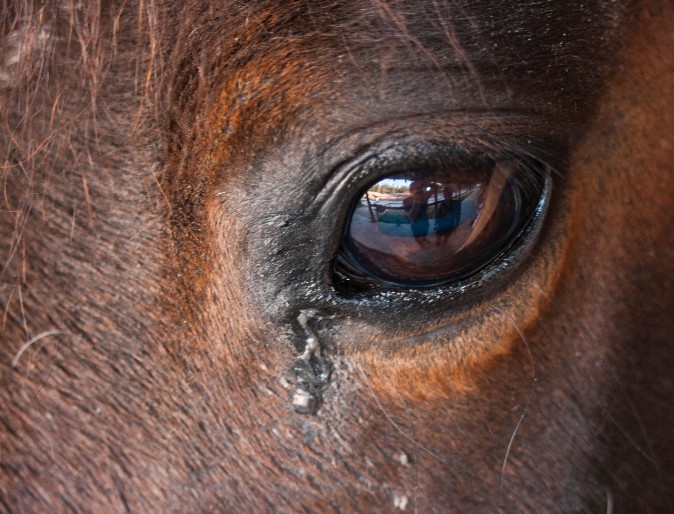Uveitis and Lyme Disease in Horses

Did you know the bacteria that causes Lyme Disease could also cause so many other problems that are often not connected?
Lyme Disease in Horses – Eye Problems to Watch Out For
Researchers have identified Borrelia-associated uveitis from Lyme disease in horses, an inflammatory eye condition that can cause significant pain to the animal and result in permanent visual field defects if untreated. Many horse owners are still unaware that horses can even get Lyme Disease, others are all too familiar with the condition as the infection can occur time and again in the same animal, sometimes causing different symptoms every time.
Uveitis in Horses – Is it Lyme Disease?
Clinical manifestations of Lyme disease in horses are often vague and nonspecific when they are observed at all. Problems with a horse’s gait, behavior, reproductive system, and eyes are some of the symptoms of Lyme disease to watch out for. Even then it is difficult to isolate the causative bacteria and tests for Lyme disease in horses are often unreliable, especially if a horse is repeatedly infected.

Documented clinical signs include:
-A lump at the site of the tick bite
-Swollen joints
-Uveitis (eye inflammation)
In clinical research the horses were diagnosed after discovery of Borrelia burgdorferi in the fluid of the eye itself. As there are a number of potential causes of uveitis in horses and humans, Lyme disease is not always the first suspicion and inappropriate corticosteroid treatment may be prescribed only making the infection worse. Serological testing is just one part of the diagnostic process with cytologic assessment, antibody, and PCR testing of ocular fluids necessary in areas where Lyme is endemic.
PCR Testing for Lyme Disease in Horses
Californian Lyme disease researchers looked at cases of Lyme disease in horses with vision problems. These cases were chronic and associated with progressive neurological disease in the animals, one of whom was diagnosed with meningoradiculoneuritis. PCR testing was used to diagnose the condition in the horses, testing fluid from the inflamed tissues including the spinal cord, muscle, and joint capsule. A specific strain of Borrelia burgdorferi (297) was sequenced, and this matched a previous cases of neuroborreliosis in a human patient
Neuroborreliosis:
A rare but very serious form of Lyme is neuroborreliosis, which is when the bacteria invades the horse’s central nervous system, causing severe issues including:
- Neurologic signs
- Fever
- Muscle wasting
- Skin sensitivity
- Difficulty eating
Other Symptoms of Lyme Disease in Horses
- Sudden mood changes
- Grouchiness
- Hypersensitivity
- Reluctance to be handled, groomed, or ridden
- Encephalitis
- Circular walking
- Blindness, and pressing the head against a wall
- Moon blindness/Uveitis
- Inability to reproduce
- Neurological abnormalities
- Stiffness
- Lameness
- Lethargy
Read: Is Garlic Safe for Horses? Top Myths Debunked
How to Prevent Lyme Disease in Horses
Pasture Management for Lyme Disease Prevention in Horses

Good pasture management is one of the main ways to prevent Lyme disease in horses with an emphasis placed on keeping grass short, as well as maintaining wide paths between areas of overgrown land and pasture. Ticks tend not to dwell in grassy areas where they cannot hide from the sun and prefer waiting in long grass for passing animals which they then latch on to for a meal. It is important to remember that ticks also carry a variety of other infectious agents, including Babesia, Rickettsia and other recently uncovered viral agents.
Respiratory problems may also be a sign of Lyme disease in horses and some horse-owners ensure that their animals have their titers tested annually, or more often, to make sure they catch Lyme disease promptly. Treatment with antibiotics prior to actual diagnosis with Lyme disease in horses is also becoming more popular but this poses the risk of creating antibiotic-resistant superbugs, as well as affecting the horse’s gastrointestinal system, liver, and general health.
Vaccinating Horses Against Lyme Disease
Vaccinating horses against Lyme disease is also an option, as with dogs, but there are safety concerns over the use of such vaccines including a suspicion that kidney problems may be connected to the vaccinations. Another major concern is simply that vaccination against Lyme disease in horses can complicate diagnosis should infection actually occur. This is because titers may be high due to vaccination and infection, making it hard for the veterinarian to determine if an active infection is present. Serological tests alone are usually insufficient to diagnose Lyme disease in horses but those with ocular manifestations of Lyme disease may have the infection confirmed by testing fluid from the eye itself.
Natural Treatment Options for Lyme Disease in Horses
When you are considering treatment options remember that natural treatments for Lyme Disease in Horses have no adverse side effects and will support your horses own ability to heal itself. Vitamins and herbs support the body’s own healing mechanism without interfering.
Strengthening the immune system of your horse should be the number one priority in treating Lyme Disease.
Herbal Supplements for Lyme Disease in Horses
With Super Immune Naturally, illnesses like Lyme Disease and EPM, stress from training, traveling and competing, or being around other sick horses won’t take a toll on your horse’s immune health.
-
 Super Immune Naturally | Immune Supplement for Horses$74.95 – $179.95
Super Immune Naturally | Immune Supplement for Horses$74.95 – $179.95
I used Super Immune Naturally for my horse with Lyme Disease and the improvement was amazing. Much better than anything the Vet subscribed. Now he’s back to his old self and we’re riding daily. Thanks for a great product! -R. Asprey
It is vitally important to supplement with herbs that help support total eye health by enhancing the circulation to the eye, providing nutrients needed for eye health, and helping to prevent free radical damage, which is a major contributor to degenerative eye diseases.
Eye Support Naturally: Is a unique blend of herbs which supply important antioxidants and nutrients to help prevent or slow the progression of most common vision disorders including Uvietis.
-
 Eye Support Naturally | Uveitis Treatment for Horses$74.95 – $179.95
Eye Support Naturally | Uveitis Treatment for Horses$74.95 – $179.95
I love doing things naturally for my horses and this is just the ticket. So far so good. Our first month and a half using the Eye Support for Uveitus and the eyes look great. My little Rocky even acts like he feels so much better. -Liz
Reducing inflammation should also be a primary goal in dealing with Lyme Disease in horses.
Circu Flow Naturally: Contains a special blend of natural herbs used for centuries that can help improve circulation to tissues, reduce inflammation, speed repair and possibly halt tissue damage.
-
 Circu-Flow Naturally | Anti Inflammatory for Horses$74.95 – $179.95
Circu-Flow Naturally | Anti Inflammatory for Horses$74.95 – $179.95
My horse has completely recovered from Lyme Disease and Uveitis thanks to your amazing products. Super Immune, Eye Support and Circu Flow Naturally have completely transformed my horse back into the happy, healthy boy he was before the Lyme Disease. I’m crying, but they are happy tears now. Thank you for giving me my best friend back! -Anna C.







